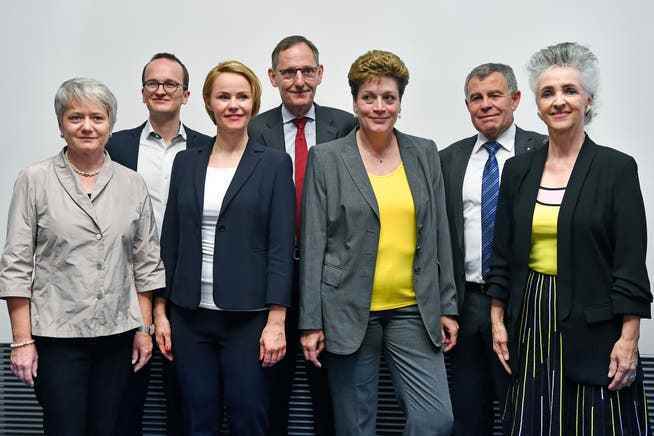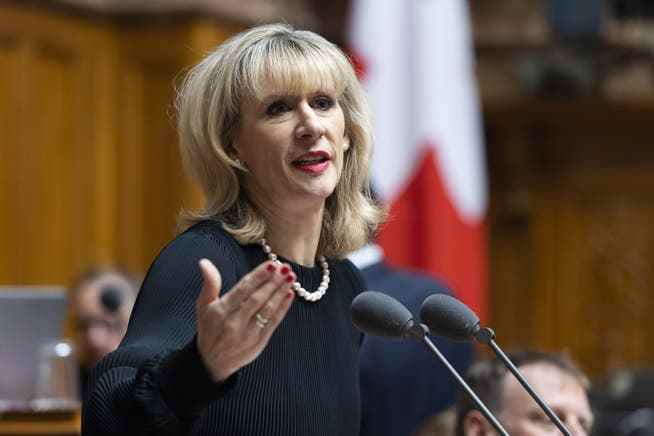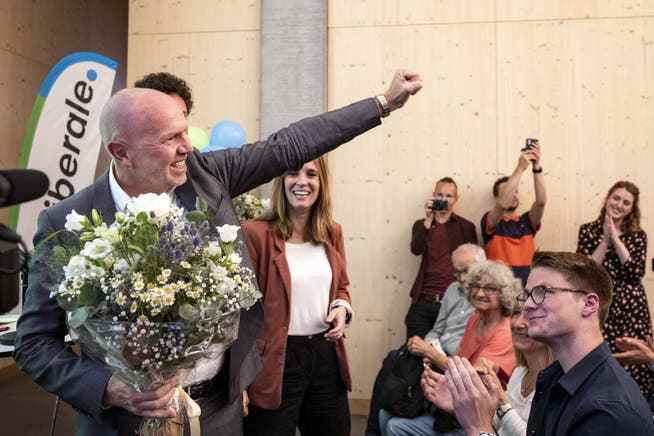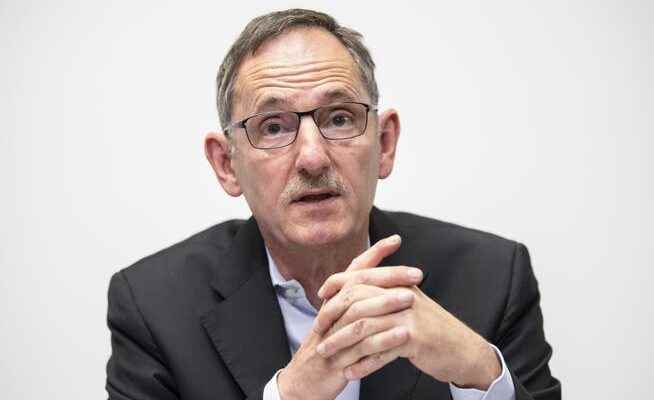In February, the canton of Zurich elects a new government and a new parliament. The most important questions at a glance.
- The SVP will again run with its two members of the government, finance director Ernst Stocker and health director Natalie Rickli.
- The SP has nominated its government councilor Jacqueline Fehr and the national councilor Priska Seiler Graf for the government council. This is the first time in the canton of Zurich that a party has two women.
- The FDP sends its economics director, Carmen Walker Späh, and Peter Grünenfelder, the director of Avenir Suisse, into the race.
- The building director Martin Neukom is aiming for another term in the Greens.
- The middle wants to defend its only seat with the education director Silvia Steiner.
- Mario Fehr (non-party, formerly SP) is the only one who has not yet commented on another candidacy.
- Cantonal Councilor Benno Scherrer is standing for the GLP, which is currently not represented in the Zurich government.
- There are also candidatures from small parties and splinter groups.
- In the elections to the cantonal council, the main interest is whether the climate alliance of SP, Greens, GLP, EPP and AL 2023 can defend its majority.
- The elections for the government council and parliament will take place unusually early, namely on February 12, 2023. This puts the parties under pressure.
The elections at a glance
When does Mario Fehr decide?
Mario Fehr (independent) no longer owes anything to any party.
Six out of seven Zurich government councilors have already announced that they will stand again. The only thing left to be decided is what Mario Fehr will do. Since leaving the SP a year ago, the security director has not owed anything to any party. He’s not in a hurry – and he enjoys letting his competitors fidget.
As Fehr reports, the decision-making process will not take much longer. “I’ll use the somewhat quieter time over the summer to make my decision,” he says. At the beginning of September he will announce his intentions.
He received a lot of encouragement to run again. It was decided that he should continue to work as security director for a safe, social and sporting canton of Zurich. “I was very touched by this encouragement about my work, and I am grateful for it.”
What is the starting position for the election to the governing council?

The Zurich Government Council in its current composition. Six of the seven members have already announced that they will stand for another term.
In 2019, the election was essentially decided between eight candidacies or, because the previous ones were hardly endangered, between three favored new candidates for two vacant seats. The new FDP candidate Thomas Vogel exceeded the absolute majority, but was eliminated as a surplus.
In 2023, the scramble for the seven seats will be greater.
First, the FDP, the governing party par excellence in the canton of Zurich, wants to make up for the 2019 gap and regain its traditional two seats. Second, the SP is aiming for a second seat, regardless of whether its renegade government councilor Mario Fehr runs again or not. Third, the Green Liberals, who remain on the upswing, are attempting to enter government.
SVP, Greens and Center will concentrate on keeping their vested rights. Should Mario Fehr run again, this would mean, together with the claims of the SP, FDP and GLP, that ten promising candidates will apply for the seven seats next year.
Which parties have already nominated?

The two newcomers to the government council: Martin Neukom (Greens) and Natalie Rickli (SVP) after their election success on March 24, 2019.
The governing parties have completed their nominations. At the FDP, Carmen Walker Späh announced in November 2021 that she would be running for a third term. In addition to her, the liberals have raised the 55-year-old Peter Grünenfelder, the director of the think tank Avenir Suisse, on the shield.
The SVP has nominated its two previous ones, i.e. the finance director Ernst Stocker and the health director Natalie Rickli. Both are undisputed within the party; the nomination was unanimous.
The middle sends the education director Silvia Steiner back into the race.
As in previous government council elections, the three conservative parties are working together and recommending their candidates to each other for election.
At the SP, the Justice Director Jacqueline Fehr occurs again. Together with her, the SP co-president and national councilor Priska Seiler Graf will try to win back the second seat that the party lost when Mario Fehr left.

National Councilor Priska Seiler Graf hopes to win back a second seat in the Zurich cantonal government for the SP.
The Greens have nominated the building director Martin Neukom, at 36 the youngest member of the government council, for another term. It is therefore foreseeable that all seven members of the Zurich Government Council will stand again in the elections.
The Green Liberals will also try to return to the government council. The party assembly has decided to send the 57-year-old canton councilor Benno Scherrer from Uster into the race. He clearly prevailed against the former SP national councilor Chantal Galladé, who has only been with the GLP since 2019.

The GLP has nominated Benno Scherrer for the government council.
Smaller parties also use the government council elections to draw attention to themselves. The left alternative list competes with Anne-Claude Hensch from the city of Zurich. The curative teacher has been a member of the cantonal council for two years. The EPP has also nominated a cantonal parliamentarian, Daniel Sommer from Affoltern am Albis. He owns a carpentry shop.
A critic of the Corona measures has also announced a candidacy: Patrick Jetzer from Dübendorf is standing for the group “Aufrecht Zürich”.
How did the 2019 election change government?
The 2019 government council elections were memorable. The biggest surprise was the success of Martin Neukom, who was only 32 at the time. He regained the seat in government for the Greens, which they had lost in 2015. Neukom’s profit came at the expense of the FDP, which has only held one seat on the Zurich government council since then.
In 2019, Natalie Rickli from the SVP also entered the government, which has had a female majority for the second time since the legislature from 2003 to 2007. The previous members Jacqueline Fehr and Mario Fehr (both SP), Ernst Stocker (SVP), Carmen Walker Späh (FDP) and Silvia Steiner (CVP) were confirmed. As of 2019, the party-political composition of the Zurich government was: 2 SVP, 2 SP, 1 FDP, 1 Green, 1 CVP (today: the centre). In the summer of 2021, the SP representative Mario Fehr left his party.
How have the weights shifted in Parliament?
The elections to the cantonal council in 2019 were also momentous. For the first time, the bourgeois parties lost their traditional majority. In the wake of the climate wave, the SP, Greens, Green Liberals, EPP and AL won a narrow majority in Parliament. This alliance put green accents on environmental issues during the new legislature. On other issues, GLP and EPP sometimes helped the bourgeoisie to gain the upper hand.
The shifts in parliament in 2019 were unusually strong for Zurich conditions. The two parties with the color green in their names gained 9 seats each. Their profits went exclusively at the expense of the bourgeois parties, whereby the end of the BDP also had an impact there. It failed because of the clause according to which each party must achieve a share of 5 percent in at least one constituency, and has since merged with the CVP to form the centre.
In addition to the advance of the Greens and the GLP, which drew closer to the FDP, the defeat of the SVP with 9 seat losses was unexpectedly strong. The largest Zurich party achieved its worst result in this century with 24.5 percent of the voters in the parliamentary elections and lost 9 of its previous 54 seats. The Greens and GLP established themselves as medium-strong political forces, each with well over 10 percent of the vote.
2019 was also a women’s election. In 2019, 71 female cantonal councilors moved into parliament. As a result, their share, which had almost stagnated in the previous elections, increased significantly to over 39 percent. Female representation continued to increase due to resignations. There are currently 77 women on the cantonal council, which is almost 43 percent.
Changes during the legislature were unusual for the Zurich Cantonal Council. Several members broke with their party. Shortly after the 2019 election, Claudia Frei-Wyssen switched from the SP to the GLP and Maria Rita Marty from the EDU to the SVP. Later in the year, Konrad Langhart, who was dismissed as cantonal president of the SVP, resigned from the party and joined the Mitte parliamentary group. Hans-Peter Amrein left the SVP parliamentary group of his own accord, but remained a member of the party. The Greens banned Urs Hans from the party because of his criticism of vaccination. Both remain on the council.
What is at stake in the cantonal council in 2023?
The elections to parliament will primarily revolve around the question of whether Climate Alliance will be able to defend its slim majority. In 2019, the SP, GLP, Greens, EVP and AL together won 94 of the 180 seats. The outcome does not depend solely on whether the big bourgeois parties can gain ground. It also plays a role whether the small parties Mitte, EVP, EDU and AL clear the 5 percent hurdle again.
Why is the election so early this time?
In recent decades, the renewal elections for the government and the cantonal council have been held in April or at the end of March. This time, the government council set February 12, 2023 as an unusually early date. As is currently the case in the cities of Zurich and Winterthur, the 2023 cantonal election campaign falls in the cold season and the holiday season at the end of the year.
The reason is that the federal government has reserved March 12 for a possible federal vote. The law precludes holding the first cantonal ballot on the same date. This also applies to voting on a public holiday.
The possible date of April 16 would have meant that the year in office could not begin as usual at the beginning of May due to appeal deadlines. On April 16, however, a second round of elections to the governing council would take place, but this is unlikely.
